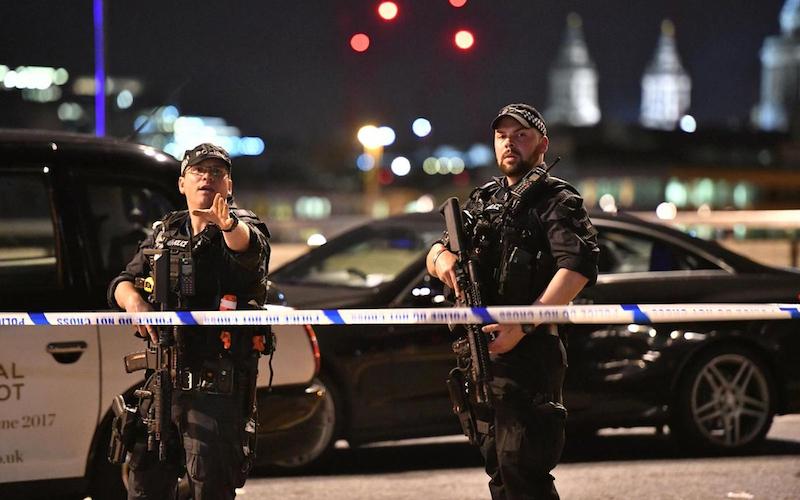
London Remains Unbroken, Can the West Remain Intact?
Two devastating terror attacks in the UK in as many weeks, remind us of the vulnerability in the West to domestic and transnational acts of terror. Soft targets, such as the Ariana Grande concert in Manchester arena, which was where a tragic suicide bombing perpetrated by Salman Ramadan Abedi, a 22-year-old UK national, claimed more than 20 lives and injured more than 119 people – many of them young concert goers and revelers whose lives were cut tragically short. More recently, the city of London was the scene of a low-grade paramilitary attack carried out by 3 knife (and vehicle) wielding assailants who indiscriminately attacked pedestrians, pub goers and people out and about on a Saturday evening.
Sadly, these types of attacks are becoming all too common place in major cities around the word, where London, is only the most recent target to fall prey to this scourge. While it is certain London will remain unbroken and the usually resolute UK will remain unbowed, can the West remain intact in terms of internal social cohesion and global leadership in combating the root causes of these events?
With investigations still underway on the UK’s 2 weeks of terror, a picture of the perpetrators is beginning to emerge that suggests, much like on the other side of the English Channel, a homeborn terror scourge is underway. In many ways, this is the hardest form of terrorism to combat and it is often a byproduct of a “hardened” posture with international counter measures and the vilification of national subgroups. Otherness, marginalization and the lack of hope in many communities around the world helps create the cadre of willing foot soldiers who are prepared to die in the name of vile ideologies, in part because they have nothing to live for.
The first line of defense and accountability are the very communities from which many of the perpetrators emanate. These are the social “tripwires” that can detect the early warning signs of self-radicalization and nefarious plots on the verge of being carried out. However, how likely are these communities to come forward as they are increasingly vilified by populist rhetoric and right-wing movements – many of which are calling for their surveillance, expulsion or internment? Boosting mental health and cultural integration efforts can go a long way in reducing the signal to noise ratio that a person has gone off the rails or an attack is imminent.
Hardening the many soft targets around the world will be impossible and will only fuel the continued growth of the security industrial-complex, which benefits from the socialization of fear and the privatization of security – or at least providing the placebo of safety. In order to truly confront these types of tragic events, which in 2 weeks in the UK have claimed 30 lives and 167 victims, is to harden our souls as citizens and to harden our policies as nations that we will not buckle in the face of fear. Of note, in this same time frame, attacks in the Middle East claimed hundreds of victims, proving yet again that Muslims are the greatest targets of terror and the world must unite in combating this scourge – including among minority populations in the West. These events always call for tradeoffs between civil rights, privacy and security. Much like how the San Bernardino terror attack pitted Apple versus the FBI in a privacy over security tug-o-war, the attacks in London raise the perennial question that underpins Western societies, which is the concept of freedom to and freedom from.
How far should we go toward an Orwellian omnipresent state in enabling domestic eavesdropping, intelligence gathering and security activity – even if it is obfuscated as metadata and only affects subgroups? How far should we go toward battle hardening and militarizing every form of mass transit, concert venue and large public gathering before we are cowed by our own sense of safety and our economies grind to a halt? The modern world is a complex and, at times, dangerous tableau being etched by the forces of populism, pluralism and urbanism and it is our adherence to national value systems – especially when they are tested by tragedies – that define who we are. Needless to say, the horrific events in the UK have been met by calls of solidarity and support across Europe and from the U.S., if we can read through Presidential tweets that have largely embittered an already strained relationship. Ironically, political retrenchment and disengagement, while it may make people feel safer in the short run, makes the world a more dangerous place.
In order to reverse the tide on these acts of terror and other mass casualty events, which are redefining normalcy in the world, we would be wise to remember that ideologies do not get stuck in customs or check in with border control. Similarly, despite the myopic goals of economic nationalism, allowing our neighbor’s problems to fester will invariably cost us more in the long run. Adopting an invest now or pay later philosophy in international development, cooperation and security can blunt the “war of worlds” narrative that fuels extremism on all sides. However strained European and transatlantic relationships have become, greater cooperation, real solidarity and a pathway to social cohesion are the real tools to arrest the wave of terror. Until then, we shall mourn the victims of these atrocities wherever they may occur and go about our lives undeterred for these events remain mercifully rare.

